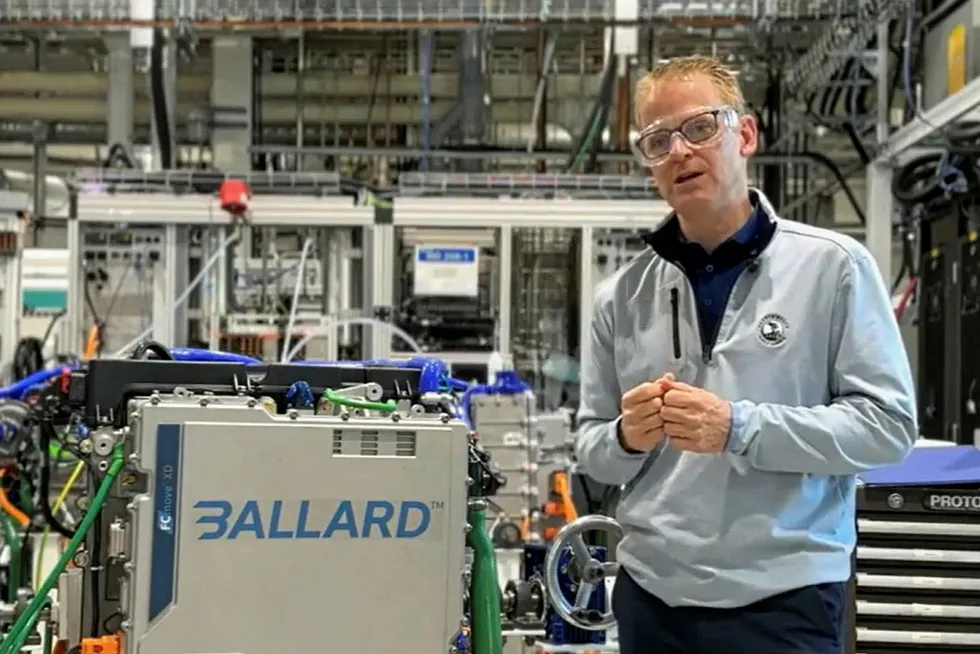'Affordable, plentiful clean hydrogen is years behind schedule', says fuel cell maker Ballard
Canadian firm slashes jobs and cuts spending by 30% due to ‘slowdown’ in H2 infrastructure development

Canadian hydrogen fuel cell maker Ballard Power Systems has instigated a radical corporate overhaul that will see it cut jobs and reduce spending by 30%, on the back of a “slowdown” in the global development of clean hydrogen production capacity and related distribution infrastructure that the company’s CEO says is years behind schedule.
Ballard, which makes fuel cell systems for use in stationary applications and in the transport sector, is also seeking to put the brakes on a planned 3GW manufacturing plant in Texas as well as its entire expansion programme in China. It is also replacing two of its senior executives.
“In the context of a challenging macroeconomic and geopolitical outlook and amid protracted policy uncertainty, we see a multi-year push-out of the availability of low-cost, low carbon hydrogen and hydrogen refuelling infrastructure,” said Randy MacEwen, Ballard’s CEO, in a press statement yesterday (Thursday). “As this delay represents a significant headwind to our corporate growth plan, we are implementing a cost restructuring to moderate our investment intensity and pacing to better align with delayed market adoption.”
This will entail job losses, the company noted, without giving details of how many, alongside a reduction annual operating expenses of 30%. Most of the savings will be realised in 2025.
The company will also reduce it capex spending, consolidate its operations and slim down its product development programme, although it stressed that none of these measures will affect its product delivery to customers.
Ballard is also mulling over its options for its planned 3GW fuel cell and components manufacturing plant in Rockwell Texas, which it first announced in March this year.
The future of the plant, scheduled for FID by the end of 2024, is materially affected by the slow-down in the hydrogen market, however Ballard has been awarded $94m in US government grants for it and is keen not to lose the funding
As a result, Ballard is exploring an extension to its financing timeline, as well as reviewing which of its cash outlays it can delay “until we have appropriate market adoption indicators”, said MacEwen.
Moreover, the company is reviewing its entire China strategy, which it embarked upon in earnest in 2018 with the tie-in with Chinese powertrain and auto-parts firm Weichai Power, which saw the Chinese firm take a near-20% stake in Ballard for $163m, in addition to a $90m technology transfer.
The deal also saw Ballard and Weichai Power form a joint venture to take Ballard’s technology into China’s market — however MacEwan reported yesterday that this venture has underperformed, adding to the “continuing challenges in the China fuel cell market”.
It is not clear whether the installation of Ballard’s systems in the tram in collaboration with China’s state-owned rolling stock operator CRRC Qingdao Sifang was also part of the Weichai Power-Ballard tie in.
“Notwithstanding the slowing timeline for market adoption, we remain confident in the long-term value proposition of hydrogen fuel cells,” insisted MacEwen. “While the speed of travel has changed, we have unwavering conviction on the direction of travel, with clean hydrogen and fuel cells playing an important role in decarbonising heavy mobility applications.”
“We will continue our focus on customers and the development of next-generation, low-cost fuel cell products for select heavy mobility and stationary power applications, while maintaining disciplined spending and balance sheet strength for long-term competitiveness and sustainability.”
Chief financial officer Paul Dobson and chief operating officer Mark Biznek will also leave Ballard as part of the corporate restructure, to be replaced respectively by former Suncor finance director Kate Igbalode and Lee Sweetland, a former technology director at the UK’s Johnson Matthey.
(Copyright)